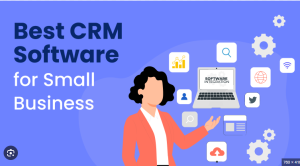
In today’s competitive market, small businesses need every advantage they can get to stay ahead. One of the most effective tools for managing growth and customer satisfaction is Customer Relationship Management (CRM) software. Whether you’re just starting out or looking to upgrade your current system, the right CRM can significantly enhance your sales, marketing, and customer service efforts. In this article, we’ll explore the best CRM software for small businesses in 2025, covering their key features, pricing, and what makes each one unique.
What is CRM Software?
CRM software helps businesses manage interactions with customers and prospects by organizing contacts, automating tasks, tracking communication, and analyzing data. For small businesses, a good CRM system can streamline operations, improve customer relationships, and boost sales without requiring a large team.
Why Small Businesses Need CRM Software
Small businesses often deal with limited resources and personnel. A CRM provides:
- Centralized customer data
- Automated sales and marketing workflows
- Improved team collaboration
- Actionable insights from analytics
- Better customer service and retention
With the right CRM in place, small businesses can compete with larger enterprises by delivering personalized, efficient customer experiences.
Top CRM Software for Small Businesses in 2025
Below is a list of the best CRM platforms tailored for small business needs. Each option includes a breakdown of its strengths, pricing, and use cases.
1. HubSpot CRM
Best for: Businesses seeking a free, user-friendly CRM with growth potential.
Key Features:
- Free forever plan
- Contact management
- Email marketing and templates
- Deal pipeline and task tracking
- Integration with Gmail, Outlook, and over 1,000 apps
Pricing:
Free plan available. Paid plans start at $18/month (Starter CRM Suite).
Why It’s Great for Small Businesses:
HubSpot is perfect for startups and small teams. Its free tools are robust enough to get started, and the platform scales easily as your business grows.
2. Zoho CRM
Best for: Budget-conscious businesses that need custom workflows.
Key Features:
- Lead and contact management
- Workflow automation
- Email and social media integration
- Analytics and reporting dashboards
- AI-powered sales assistant (Zia)
Pricing:
Starts at $14/user/month. Free edition available for up to 3 users.
Why It’s Great for Small Businesses:
Zoho CRM combines affordability with powerful features. Its flexible customization options and native integration with other Zoho apps make it ideal for growing small businesses.
3. Salesforce Essentials
Best for: Businesses that want industry-leading features in a simplified package.
Key Features:
- Lead and opportunity tracking
- Email integration with Einstein Activity Capture
- Mobile app and dashboard
- Customer support automation
- Integration with Slack and third-party apps
Pricing:
Starts at $25/user/month.
Why It’s Great for Small Businesses:
Salesforce Essentials offers enterprise-level functionality tailored for small businesses. It’s a smart choice for those who want powerful automation and analytics without complexity.
4. Freshsales by Freshworks
Best for: Sales-focused businesses needing a built-in phone system.
Key Features:
- AI-powered lead scoring
- Visual sales pipeline
- Built-in email and phone
- Automation workflows
- Reporting and forecasting
Pricing:
Free plan available. Paid plans start at $15/user/month (Growth plan).
Why It’s Great for Small Businesses:
Freshsales offers a strong CRM with communication tools built in, eliminating the need for third-party services. It’s great for teams focused on closing deals efficiently.
5. Pipedrive
Best for: Teams that want a visual, easy-to-use sales CRM.
Key Features:
- Visual sales pipelines
- Customizable stages and fields
- Email templates and tracking
- Smart contact data
- Workflow automation
Pricing:
Starts at $14/user/month. 14-day free trial available.
Why It’s Great for Small Businesses:
Pipedrive’s intuitive interface makes it ideal for small sales teams. It focuses on simplicity and efficiency, helping teams close more deals with less effort.
6. Insightly
Best for: Businesses combining project management and CRM.
Key Features:
- CRM and project management in one
- Email tracking
- Lead routing and workflow automation
- Custom dashboards and reports
- App integrations including Gmail, Outlook, and QuickBooks
Pricing:
Starts at $29/user/month. Free plan available for basic features.
Why It’s Great for Small Businesses:
Insightly bridges the gap between CRM and project management. It’s perfect for service-based businesses that manage ongoing client projects.
7. Keap (formerly Infusionsoft)
Best for: Service-based businesses looking for marketing automation.
Key Features:
- CRM and email marketing automation
- Appointment scheduling
- Lead capture and follow-up
- Invoicing and payments
- Custom sales pipelines
Pricing:
Starts at $159/month for up to 1,500 contacts.
Why It’s Great for Small Businesses:
Keap is ideal for entrepreneurs and service businesses looking to automate repetitive tasks and manage client relationships in one platform.
How to Choose the Right CRM for Your Small Business
Choosing the right CRM depends on your business size, budget, industry, and workflow needs. Here are key factors to consider:
- Ease of Use: Choose software that your team can learn quickly.
- Features: Identify which features matter most—email integration, automation, sales tracking, etc.
- Scalability: Pick a CRM that can grow with your business.
- Integrations: Ensure the CRM integrates with your existing tools.
- Customer Support: Look for reliable support and a helpful knowledge base.
- Budget: Balance between cost and functionality. Free or low-cost CRMs can still deliver excellent value.
Conclusion
The best CRM software for small businesses in 2025 offers powerful tools without overwhelming complexity or cost. Whether you choose HubSpot for its free tools, Zoho for its affordability, or Salesforce for its scalability, the key is to align your choice with your specific business needs.